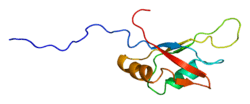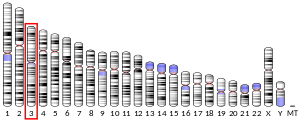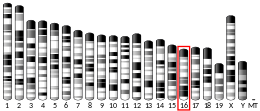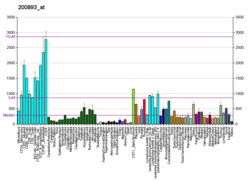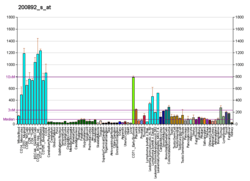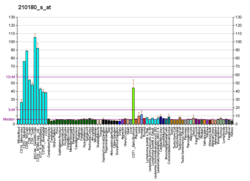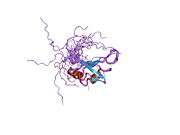TRA2B
Transformer-2 protein homolog beta, also known as TRA2B previously known as splicing factor, arginine/serine-rich 10 (transformer 2 homolog, Drosophila) (SFRS10), is a protein that in humans is encoded by the TRA2B gene.[5][6]
Interactions
TRA2B has been shown to interact with RBMX.[7]
gollark: The limits are mass and not volume. Mostly.
gollark: Also arms are heavy, or if they're not heavy will just break.
gollark: Then stop looking at it!
gollark: Then don't destroy it!
gollark: *Crew?*
References
- GRCh38: Ensembl release 89: ENSG00000136527 - Ensembl, May 2017
- GRCm38: Ensembl release 89: ENSMUSG00000022858 - Ensembl, May 2017
- "Human PubMed Reference:". National Center for Biotechnology Information, U.S. National Library of Medicine.
- "Mouse PubMed Reference:". National Center for Biotechnology Information, U.S. National Library of Medicine.
- "Entrez Gene: SFRS10 splicing factor, arginine/serine-rich 10 (transformer 2 homolog, Drosophila)".
- Nayler O, Cap C, Stamm S (October 1998). "Human transformer-2-beta gene (SFRS10): complete nucleotide sequence, chromosomal localization, and generation of a tissue-specific isoform". Genomics. 53 (2): 191–202. doi:10.1006/geno.1998.5471. PMID 9790768.
- Hofmann, Yvonne; Wirth Brunhilde (Aug 2002). "hnRNP-G promotes exon 7 inclusion of survival motor neuron (SMN) via direct interaction with Htra2-beta1". Hum. Mol. Genet. 11 (17): 2037–49. doi:10.1093/hmg/11.17.2037. ISSN 0964-6906. PMID 12165565.
Further reading
- Matsuo N, Ogawa S, Imai Y, et al. (1996). "Cloning of a novel RNA binding polypeptide (RA301) induced by hypoxia/reoxygenation". J. Biol. Chem. 270 (47): 28216–22. doi:10.1074/jbc.270.47.28216. PMID 7499316.
- Lennon G, Auffray C, Polymeropoulos M, Soares MB (1996). "The I.M.A.G.E. Consortium: an integrated molecular analysis of genomes and their expression". Genomics. 33 (1): 151–2. doi:10.1006/geno.1996.0177. PMID 8617505.
- Beil B, Screaton G, Stamm S (1997). "Molecular cloning of htra2-beta-1 and htra2-beta-2, two human homologs of tra-2 generated by alternative splicing". DNA Cell Biol. 16 (6): 679–90. doi:10.1089/dna.1997.16.679. PMID 9212162.
- Imai Y, Matsuo N, Ogawa S, et al. (1998). "Cloning of a gene, YT521, for a novel RNA splicing-related protein induced by hypoxia/reoxygenation". Brain Res. Mol. Brain Res. 53 (1–2): 33–40. doi:10.1016/S0169-328X(97)00262-3. PMID 9473574.
- Tacke R, Tohyama M, Ogawa S, Manley JL (1998). "Human Tra2 proteins are sequence-specific activators of pre-mRNA splicing". Cell. 93 (1): 139–48. doi:10.1016/S0092-8674(00)81153-8. PMID 9546399.
- Nayler O, Cap C, Stamm S (1998). "Human transformer-2-beta gene (SFRS10): complete nucleotide sequence, chromosomal localization, and generation of a tissue-specific isoform". Genomics. 53 (2): 191–202. doi:10.1006/geno.1998.5471. PMID 9790768.
- Eldridge AG, Li Y, Sharp PA, Blencowe BJ (1999). "The SRm160/300 splicing coactivator is required for exon-enhancer function". Proc. Natl. Acad. Sci. U.S.A. 96 (11): 6125–30. Bibcode:1999PNAS...96.6125E. doi:10.1073/pnas.96.11.6125. PMC 26846. PMID 10339552.
- Lai MC, Lin RI, Huang SY, et al. (2000). "A human importin-beta family protein, transportin-SR2, interacts with the phosphorylated RS domain of SR proteins". J. Biol. Chem. 275 (11): 7950–7. doi:10.1074/jbc.275.11.7950. PMID 10713112.
- Venables JP, Elliott DJ, Makarova OV, et al. (2000). "RBMY, a probable human spermatogenesis factor, and other hnRNP G proteins interact with Tra2beta and affect splicing". Hum. Mol. Genet. 9 (5): 685–94. doi:10.1093/hmg/9.5.685. PMID 10749975.
- Helmken C, Wirth B (2001). "Exclusion of Htra2-beta1, an up-regulator of full-length SMN2 transcript, as a modifying gene for spinal muscular atrophy". Hum. Genet. 107 (6): 554–8. doi:10.1007/s004390000409. PMID 11153908.
- Young PJ, DiDonato CJ, Hu D, et al. (2002). "SRp30c-dependent stimulation of survival motor neuron (SMN) exon 7 inclusion is facilitated by a direct interaction with hTra2 beta 1". Hum. Mol. Genet. 11 (5): 577–87. doi:10.1093/hmg/11.5.577. PMID 11875052.
- Hofmann Y, Wirth B (2003). "hnRNP-G promotes exon 7 inclusion of survival motor neuron (SMN) via direct interaction with Htra2-beta1". Hum. Mol. Genet. 11 (17): 2037–49. doi:10.1093/hmg/11.17.2037. PMID 12165565.
- Strausberg RL, Feingold EA, Grouse LH, et al. (2003). "Generation and initial analysis of more than 15,000 full-length human and mouse cDNA sequences". Proc. Natl. Acad. Sci. U.S.A. 99 (26): 16899–903. Bibcode:2002PNAS...9916899M. doi:10.1073/pnas.242603899. PMC 139241. PMID 12477932.
- Tran Q, Coleman TP, Roesser JR (2003). "Human transformer 2beta and SRp55 interact with a calcitonin-specific splice enhancer". Biochim. Biophys. Acta. 1625 (2): 141–52. doi:10.1016/S0167-4781(02)00600-0. PMID 12531473.
- El Yazidi-Belkoura I, Adriaenssens E, Dollé L, et al. (2003). "Tumor necrosis factor receptor-associated death domain protein is involved in the neurotrophin receptor-mediated antiapoptotic activity of nerve growth factor in breast cancer cells". J. Biol. Chem. 278 (19): 16952–6. doi:10.1074/jbc.M300631200. PMID 12604596.
- Jiang Z, Tang H, Havlioglu N, et al. (2003). "Mutations in tau gene exon 10 associated with FTDP-17 alter the activity of an exonic splicing enhancer to interact with Tra2 beta". J. Biol. Chem. 278 (21): 18997–9007. doi:10.1074/jbc.M301800200. PMC 2140226. PMID 12649279.
- Chen X, Guo L, Lin W, Xu P (2004). "Expression of Tra2beta isoforms is developmentally regulated in a tissue- and temporal-specific pattern". Cell Biol. Int. 27 (6): 491–6. doi:10.1016/S1065-6995(03)00072-6. PMID 12798777.
- Helmken C, Hofmann Y, Schoenen F, et al. (2004). "Evidence for a modifying pathway in SMA discordant families: reduced SMN level decreases the amount of its interacting partners and Htra2-beta1". Hum. Genet. 114 (1): 11–21. doi:10.1007/s00439-003-1025-2. PMID 14520560.
- Li J, Hawkins IC, Harvey CD, et al. (2003). "Regulation of alternative splicing by SRrp86 and its interacting proteins". Mol. Cell. Biol. 23 (21): 7437–47. doi:10.1128/MCB.23.21.7437-7447.2003. PMC 207616. PMID 14559993.
- Ota T, Suzuki Y, Nishikawa T, et al. (2004). "Complete sequencing and characterization of 21,243 full-length human cDNAs". Nat. Genet. 36 (1): 40–5. doi:10.1038/ng1285. PMID 14702039.
This article is issued from Wikipedia. The text is licensed under Creative Commons - Attribution - Sharealike. Additional terms may apply for the media files.
